Ford is shoving a V8 back into the F-150 Raptor and calling it the “Raptor R.” (And yes, it will be street legal, contrary to what you may have read earlier). Keep reading this article for a little more on that and on the all-new 2021 Ford Raptor, which for the first time ever brings coil springs to the F-150.
Ford just debuted the 2021 Ford Raptor, and it was my journalistic duty — and my obligation as a car enthusiast — to make sure that this article begins with the information you all deserve. So I broke out the magnifying glass:

The results:

But don’t exit the browser in a blind rage! I called up Ford after seeing this CNET story about how a non-street-legal V8 Raptor is on the horizon (CNET, to its credit, received that inaccurate information from Ford, and has updated its story), and boy do I have good news. “We can confirm that there will be a V8 in the Raptor R coming next year,” a Ford truck communications manager said. “The rumor that our Raptor R will not be street legal is not correct.”
“Raptor R will 100 percent be street legal.”
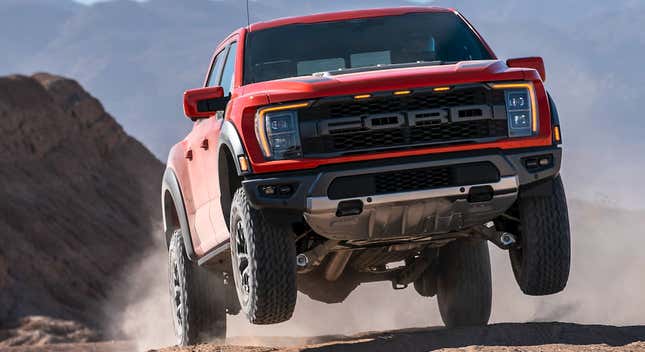
I’m going to fill the rest of this story out with details on the new 2021 Ford F-150 Raptor, which gets new, big-ass 37-inch tires, upgraded suspension and a slew of other tweaks. But for now, I need to get the news that the V8 is coming out the door. To delay any further would be a crime against humanity.
More on the new Raptor:
The year 2021 marks the release of a new generation Ford F-150, and after having driven it, I can say: It’s excellent. With a fresh F-150 out, it was only a matter of time before the F-150-based Raptor followed, and now it’s here.
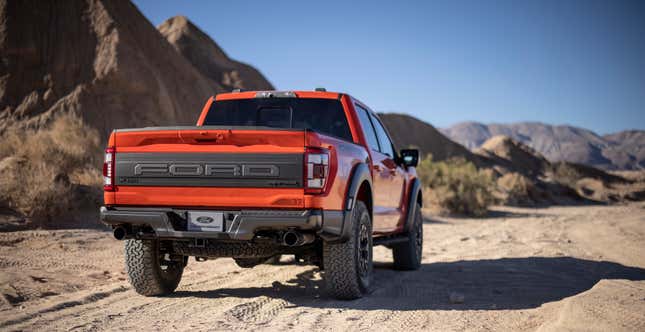
The 2021 model gets a 3.5-liter EcoBoost V6 like the outgoing truck, likely making around 500 horsepower and 550 lb-ft of torque (Ford hasn’t released official figures). And while that may seem a bit boring to those of us who don’t particularly like the sound of Ford’s EcoBoost V6 engines, there’s a lot more to this new truck than just a tweaked version of the outgoing motor on a new platform fairly similar to the old one.
For one, it’s clear that Ford was well aware of the outgoing Raptor’s aural shortcomings, with the team developing an exhaust that apparently yields a “throatier engine sound”:
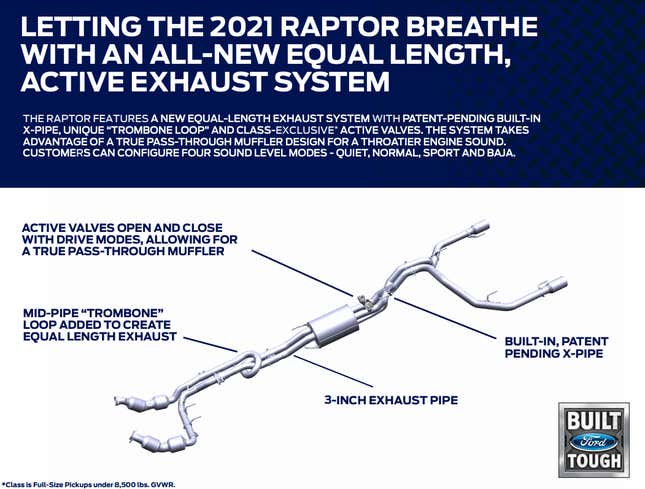
Ford writes about this exhaust system in its press release, stating:
A new three-inch equal-length exhaust system features a patent-pending built-in X-pipe, unique “trombone loop” and first-for-Raptor active valves. The system takes advantage of a true pass-through muffler design that improves sound quality. Customers can configure four sound level modes – Quiet, Normal, Sport and Baja.
But if that’s not enough to sway you, you should know that the 2021 Raptor also introduces a first to the Ford F-150:
That’s a five-link coil-sprung suspension instead of leaf springs that have been tucked under the beds of every production Ford F-150 ever. The completely new rear suspension design, Ford says, improves wheel travel, handling, and acceleration (since, Ford claims, the setup makes it easier for the truck to put power to the ground).
Though not often used in heavy duty truck applications—but prevalent in the off-road rally world—coil springs are generally considered better than leaf springs when it comes to ride and handling. Key to a coil spring setup is the fact that it decouples lateral stiffness from spring rate, since the track bar (or “panhard rod”) handles lateral loads, and the coil springs are then charged with simply suspending the vehicle. Leaf springs, on the other hand, must do it all—keep the axle centered by withstanding lateral forces and also suspend the load. This makes it difficult to tune ride and handling independently, and in a precise way.
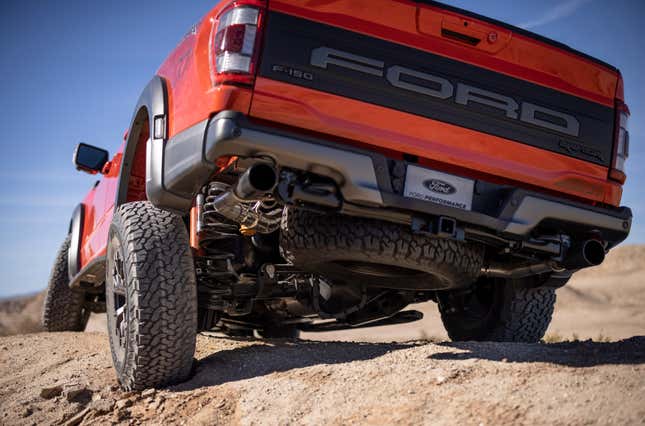
Fox internal bypass shocks shocks are charged with damping those springs’ motion, and keeping the 35-inch or 37-inch smoothly clawing away at the desert sand below.
Ford says payload and towing capacity are up over the old Raptor by 200 pounds to 1,400 and 8,200 pounds, respectively. An optional Torsen limited-slip front differential and a standard rear locking diff make sure the wheels with grip always get engine torque so the vehicle can keep moving.
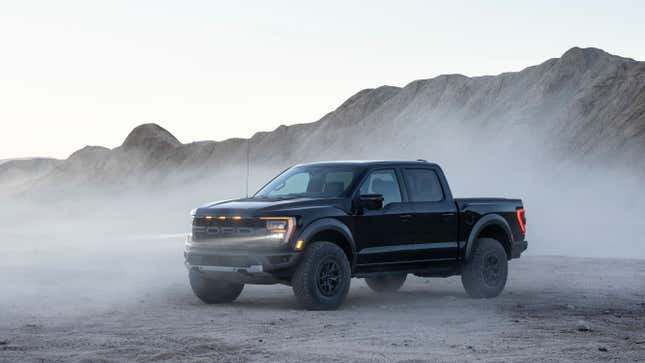
The off-roaders among you will likely be happy to hear that, with the 35-inch tires, the truck has a foot of ground clearance, and its approach angle is 31 degrees, departure angle is 23.9, and breakover angle is 22.7. Those rise to 33.1, 24.9, and 24.4, respectively, when the truck’s wheels are wrapped in 37s. Ground clearance climbs by an inch.
These are all improved over the outgoing Raptor’s 11.5-inches of ground clearance, 30.2 degree approach angle, and 23 degree departure angle, and 21.8 degree breakover angle. Note that all of these figures are for the SuperCrew configuration. A SuperCab configuration will not be available on the new F-150 Raptor.
This story has been updated.